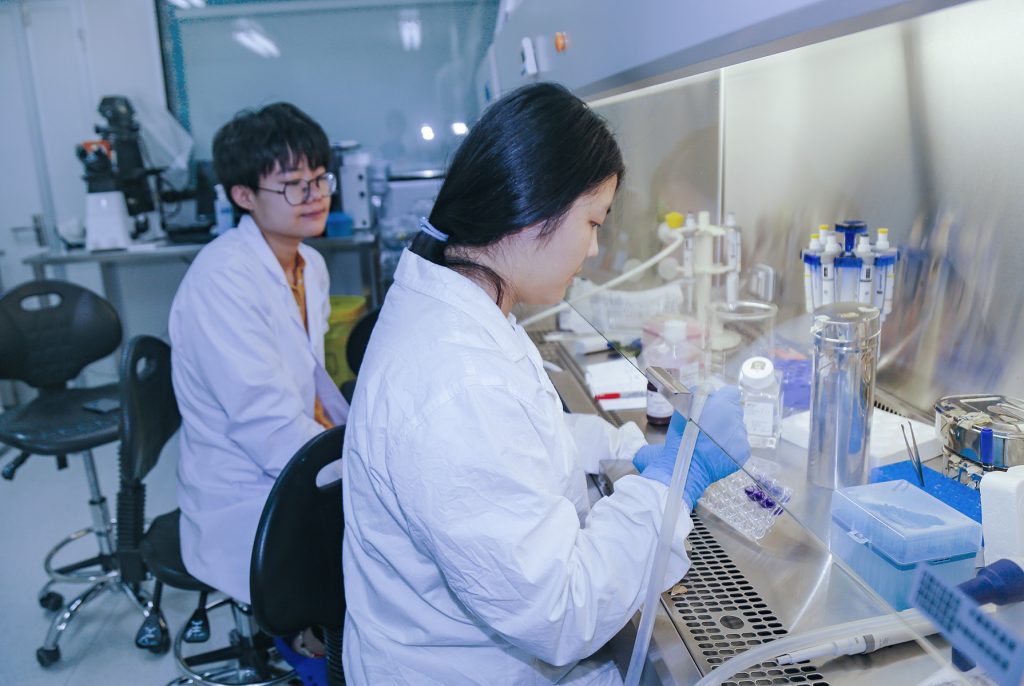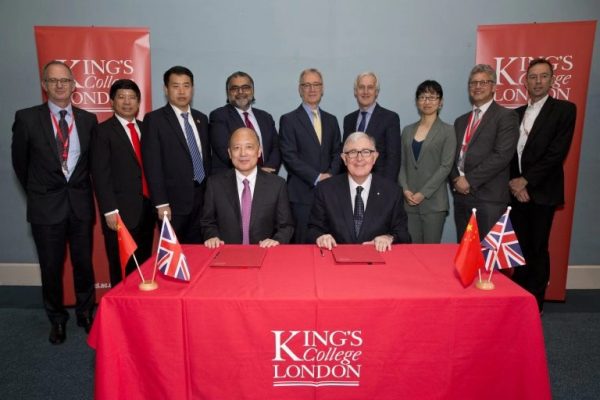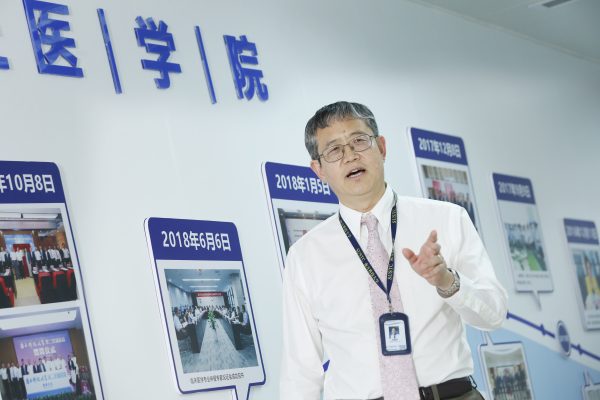One month ago, SUSTech welcomed Michael Mingzhao Xing, M.D., Ph.D., as the founding Dean of the School of Medicine. Previously, he was a tenured Professor of Medicine, Oncology, Pathology, and Cellular & Molecular Medicine at Johns Hopkins University School of Medicine. Prior to his SUSTech appointment, he served as Director of the Johns Hopkins Thyroid Tumor Center, and Chief of the Laboratory for Cellular and Molecular Thyroid Research at Johns Hopkins.
His main clinical and research interests are thyroid diseases, particularly thyroid tumor, with over 170 publications in various prestigious journals, such as JAMA, Lancet, Journal of Clinical Oncology, JAMA Oncology, Nature Communications, Clinical Cancer Research and Cancer Research. He holds or co-holds ten USA patents on biological medicine. Dr. Xing’s work has had a profound impact on today’s molecular-based precision management of thyroid tumor and is consistently among world’s top 0.01% citations in the thyroid neoplasm field, with 17,000 citations.
For the last nearly two decades, Dr. Xing had been working at Johns Hopkins Hospital as an endocrine sub-specialty consultant and teaching attending while directing a thyroid research laboratory as a physician scientist there.
We did a bit of research about you and were particularly interested in your previous work experience and academic achievements. Could you tell us why you choose SUSTech and its School of Medicine?
Returning to China is not an easy decision for me, but a young vibrant city that holds an energetic university is incredibly tempting. Shenzhen is a city of innovation, and so is SUSTech, a young public research university in the heart of the city.
More importantly, the spirit of SUSTech touched me. Specifically, SUSTech and I hold the same philosophy— “Dare to forge ahead” and commitment to innovation and excellence.
I have been here for just a month and I feel like a “freshman” here. The beautiful campus, the innovative research facilities, the strong international faculty and staff, and the outstanding students all matched my expectation of a rising-star young research university. This is attributed to the superb leadership of SUSTech and strong support, including financial support, of the Shenzhen government. The School of Medicine of SUSTech has been created in this unique intellectual atmosphere and governmental environment and holds unlimited promises.
How did the opportunity of becoming Dean arise?
I was initially invited by President Chen Shiyi of SUSTech to explore career opportunities here. Strongly encouraged by President Chen, I become excited by the opportunity to become the Dean to lead a new vigorous School of Medicine at SUSTech. With my high respect and admiration for President Chen’s amazing leadership and adorable personal characters, I quickly accepted the honor to be his first Dean of the School of Medicine.
We are very interested in knowing the School’s future development and perhaps also its development history.
The SUSTech School of Medicine has a short history. Rooted in Shenzhen and embracing China and the world, the aims of our school are to become an internationalized first-class medical academic institution, with integration of science, technology and medicine. I hope that with the support of the University leadership and our faculty and staff as well as my my experience in clinical, research and education, the School will become a benchmark for China’s new medical education. This will be helped by our effort to explore a new form of internationally-oriented medical education in China.
I want to briefly summarize, in a flashback manner as follows, the mile stones in the short development history of this School of Medicine, from which the School will grow and mature rapidly.
The SUSTech School of Medicine is now fully established and energetically operating on the path to “New Medicine”. The tripartite missions of our School are to educate students to become future medical leaders with international vision, innovative creativity, and intellectual and moral integrity; to lead cutting-edge scientific research to promote improvement of health and progress of medicine; and to strive for clinical excellence and top-notch patient care.
What are your major plans to put “New Medicine ” into action?
Actions are being taken. We are experiencing a different development path compared with the traditional medical school. The idea of “New Medicine” is to integrate classical medicine with basic science, engineering, and humanity sciences, taking the advantage of the extraordinary strengths of these areas on the SUSTech campus. Currently, SUSTech possesses two affiliated hospitals and two joint district government-university hospitals (SUSTech Hospital and SUSTech-Yantian Hospital). A campus-based affiliated teaching hospital is at the planning stage. The strong connection and integration with the colleges and departments in basic science, engineering, and humanity sciences across the campus, SUSTech’s international faculty, shared research facilities and platforms, and public services will enable us to develop the innovative “New Medicine”, consisting of interdisciplinary education and research programs in clinical medicine integrated with related modern disciplines.
We have the following specific plans:
The essential goal of these efforts for the “New Medicine” is to provide the highest standard of clinical patient care and biomedical scholarship to improve the health in Shenzhen, Guangdong, China and beyond and to train the best future leaders in modern medicine, particularly physician scientists.
I think the term Physician-Scientist is unfamiliar to most of our readers. Could you describe it in a simple way and tell us the reasons for setting it as a long-term educational goal for our students?

A physician-scientist is a career pursuer in science and medicine who invests time and professional effort in both scientific research and direct clinical practice. A good physician scientist is someone who has strong and solid training in both basic science research and clinical medicine. Such a professional cannot only perform cutting-edge scientific research but also act as a superb clinician.Given such unique backgrounds, physician-scientists are often regarded as playing a critical role in translational medicine and clinical research, moving bench laboratory findings to clinical patient care applications. Progress in science and technology promotes the progress of medicine, and medical technology innovation is the foundation of modern medicine. The importance of physician scientists’ role in such pursuit in modern medicine has been widely recognized.
At the moment, the majority of students trained in medical schools in China will either become a physician or a scientist after graduation, not physician scientist. Even in developed countries, physician scientists are uncommonly seen due to the high expenses to train them However, the societal need for such scholarship is accelerating. Consequently, many medical schools are seriously repositioning their strategies by creating new physician scientist training programs. To train medical students into physician scientists who will become capable future leaders to advance the progress of medicine is an important strategic plan of the SUSTech School of Medicine.
What are the goals and measures of the undergraduate education in the Medical School?
The SUSTech School of Medicine currently offers three undergraduate programs: biomedical engineering, biological medicine, and clinical medicine. These programs are to train future scientific, technological, or clinical leaders in bioengineering, biomedical sciences, or clinical medicine to serve the society.
We adopt an innovative patient-centered medical education model and build teaching facilities and laboratories with international standards, including a leading laboratory teaching center, an innovation research platform, and a clinical teaching center for students.
In educating medical students, we emphasize the concept of humanity based on the fact that medicine is patient-oriented and serves patients. The School of Medicine will provide students with opportunities to participate in early clinical experience and health-related community services, while understanding individuals’ health and disease. Students will also be trained to become effective communicators, develop strong bioethics and high moral values. Students from this School will not only master professional expertise and skills but, importantly, also have outstanding humanistic qualities. To ensure the high quality in all these undergraduate teaching and training programs and activities, we constantly recruit the best teachers globally.
Since we already prepared to build a joint medical school with KCL? What is your next or future global engagement plan?

To build a joint medical school with King’s College London (KCL) is a strategic plan of the SUSTech. The goal is to use the internationally outstanding expertise and techniques of KCL long-history medical education to accelerate the development, growth, and maturation of the SUSTech School of Medicine’s clinical education into one with high level of international standards. This strategy is consistent with the School’s goal to become an internationally-oriented first-class academic medical institution. SUSTech and the School are actively working with KCL to develop a full-fledged five-year medical education curriculum and details of other collaborative programs.
We know you are interested in thyroid diseases research, what projects are you working on at the moment?
My clinical and research interests are both in thyroid diseases, particularly thyroid tumors. Thyroid cancer is a common endocrine disease whose management requires to follow the principle of precision medicine based on molecular-guided approaches. As a physician scientist for nearly two decades at Johns Hopkins, I have been engaged mostly in translation research on thyroid cancer, moving our molecular, particularly genetic, findings made in the lab to the clinical diagnosis, risk prognostication, and molecular targeting of thyroid cancer in patients in the clinic. My administrative role as the Dean of the Medical School is quite occupying at this time, but I will soon resume research in this area by building a translational research laboratory and collaborating with physician colleagues in the affiliated hospitals of the SUSTech School of Medicine.

Why become a doctor?
The medical career is an extremely effort-demanding journey, particularly the early education and training years. The simple moral philosophy to become a doctor when I was young was to cure diseases and save lives of patients. This was the most sacred mission of being a doctor, which has constantly encouraged me to pursue the medical career even today. As a physician for the last several decades, it has been a constant gratification every time I finish an outpatient clinic or an inpatient round, helping numerous patients cured or relieved from their diseases. I treated this gratification as the best payment off for the hardship that I experienced during the early years of medical education and clinical training in my medical career.
I later realized that as a pursuer of medical career, my gratification could be beyond that from direct clinical patient care. I was fortunate that during my early medical school years, as a medical student I was advised and guided by my professors to start research experience by participating in extra-curricular research activities in professors’ laboratories. This laid the foundation for my later maturation of a strong interest in scientific research, leading to my pursuit for a PhD training and subsequent postdoctoral training in both research and clinical medicine. I then became a MD-PhD physician scientist who is both a capable scientist and skilled clinician, with considerable contributions to novel molecular/genetic discoveries and their clinical application to the diagnosis and treatment of diseases, particularly thyroid cancer. It is the strong training both in medicine and science that enables me to perform my physician scientist’s role and to be able to make considerable contributions to medicine that I have made. This is the most fortunate and gratifying part of my life, which makes me feel that it is worth having gone through the rough journey of a medical career.
What advice would you give to medical students and all the SUSTech students?
Once you have chosen your career path, stay on it and work for it; you are then destined to its success.
Proofread ByXia Yingying
Photo BySchool of Medicine